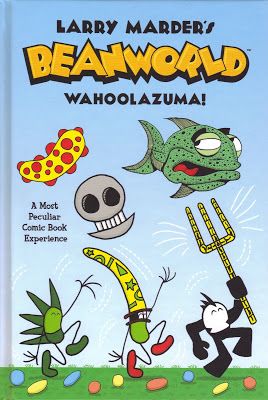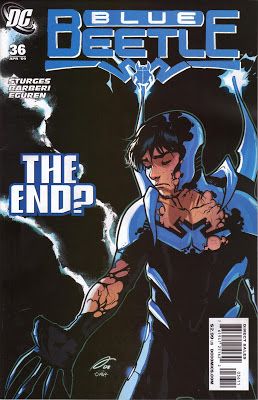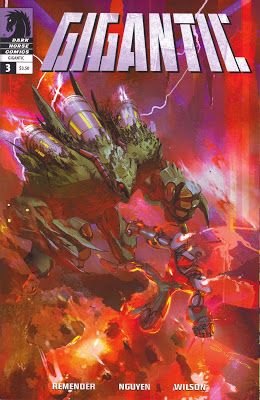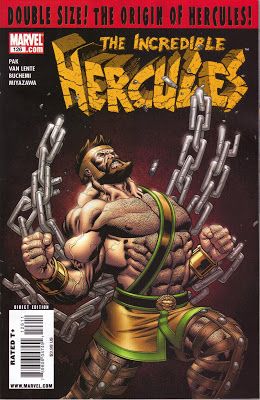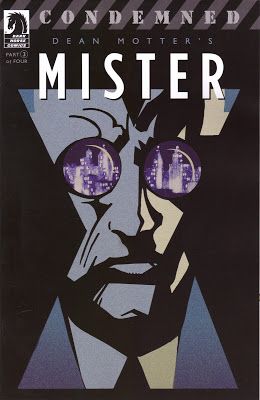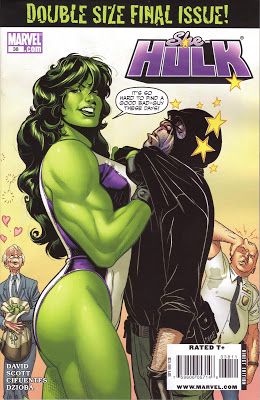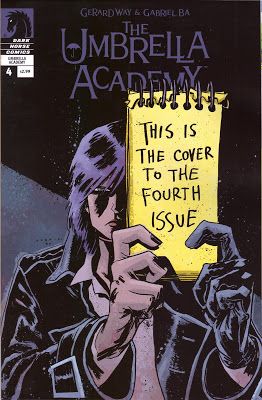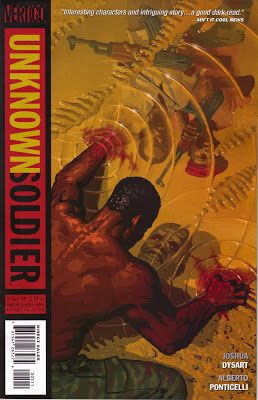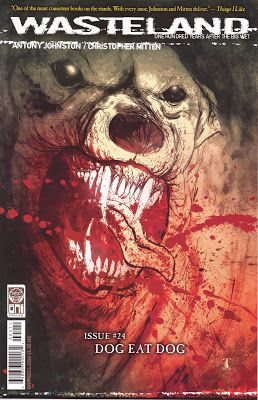Two series crash and burn, and Jay Faerber makes a funny! It's all in this week's post!
(Oh, and because I'm so very envious of Our Dread Lord and Master getting all the comments, what with his Final Crisis posts and book deals and whatnot, at the end of this post I have pictures of cute girls in superhero costumes ... making out with each other! That should bring the traffic!)
By the way, that sound you heard today? That strange noise that sounded disturbingly close to someone having ... you know ... pleasure ... of a ... um ... romantic nature? I hate to say it, but that was our own MarkAndrew, when he got a look at this on the new comics shelf:
Oh, MarkAndrew. Just clean up before you leave.
Now, onward!
Blue Beetle #36 ("Only Change Endures Part 2 of 2") by Matthew Sturges (writer), Carlo Barberi (penciller), Jacob Eguren (inker), Guy Major (colorist), and Travis Lanham (letterer). $2.99, 22 pgs, FC, DC.
The cover asks the question "The End?" It's the last issue - of course it's the end!!!! Oh well.
This series, unfortunately, has been spinning its wheels a bit since Rogers left, and it was apparently on life support then, so it's more than somewhat surprising that it lasted a year since issue #25. It hasn't been bad, with some nice stories and some good character development, but there's been something missing, mainly because it seemed like the writers (Will Pfeifer and Matthew Sturges, for the most part) have been simply treading water, waiting for the axe to fall. Sturges wraps it up with a nice tie-in to Rogers' epic story, and while it's handled well, because Sturges isn't the main caretaker of the character and Jaime's moving on to the Titans anyway, he (Sturges, that is) can't really do all that much with him. Jaime doesn't die or lose his powers, for instance. Not that I want him to, but the last arc hasn't really felt like anything special - the book just ends, and Jaime moves on. As a member of the Titans, we're sure to see less of Jaime's family and friends, which is a shame, because although the fact that Jaime tries to figure things out without punching the bad guys is refreshing, his supporting cast has always been more interesting than most.
Speaking of supporting casts, one of them dies in this issue. It was quite annoying. You might counter with "But Greg, you wanted something EPIC!" Well, yes. But the death was dumb. It was rather meaningless, unimportant, and crass. It meant nothing in the scope of the story, and was in the story - why? To tug at heartstrings? Well, it doesn't, and the attempt to do so is annoying. I don't mind people dying in comics, because THEY'RE NOT REAL, but deaths ought to be meaningful. This one isn't. All it does is make Jaime sad.
Oh, and Jaime falls to earth from space with no protection and does not die. That's kind of silly.
Dynamo 5 #20 by Jay Faerber (writer), Mahmud A. Asrar (artist), Ron Riley (colorist), and Charles Pritchett (letterer). Back-up story ("Rough Mourning") by Stephen Nilson (writer), Wesley Gunn (penciller), Josh Templeton (inker), Wesley Wong (colorist), and Charles Pritchett (letterer). $3.50, 20 pgs + 5-pg back-up story, FC, Image.
Before I opened this book, I wondered why Asrar showed Bridget staring right at the woman's chest. Then I read the issue.
That's a Power Girl analog, by the way (note the window in the costume). She shows up halfway through the book and announces herself: "You know better than to use that name in public. In public ... I'm War Chest!"
Yes, her superhero name is War Chest. That's so awesome. If only PG would change her name to that. Later, when the Dynamo 5 kids show up, they actually make fun of her. Bridget tells her she's going to put someone's eyes out with "those things." Man, I love this comic.
The fight is rather goofy, mostly because of what caused it. This is basically an issue to get Bridget moved from Los Angeles to Tower City, get Hector a date, and advance the subplot with the kids' half-sister, who's eeeeeevil. And, of course, it looks superb.
This is the third Dynamo 5 issue that came out in February, if you count the zero issue from last week (and why not?). It's good to see it getting caught up a bit.
Gigantic #3 (of 5) by Rick Remender (writer), Eric Nguyen (artist), Matthew Wilson (colorist), and Rus Wooton (letterer). $3.50, 22 pgs, FC, Dark Horse.
Gigantic ought to be better, but there's something missing about it. I'm not sure what it is, either. This issue is mostly a big fight between Gigantic and that big rocky dude on the cover, with the fate of the world in the balance, which should be awesome, but it's not quite. Nguyen's art is solid, although in a few panels, the perspective is really screwed up and it's hard to figure out what, exactly, is supposed to be happening. Remender is doing his thing, with the clever idea behind the series - that Earth was created for entertainment, and now it's being "cancelled" - still the best thing about this. Remender hasn't done much with the characters, even in this issue, where we get a bit of Gigantic's "origin story." It's a clever premise for a series, but it's leaving me cold. Remender mentions that they're trying to do short arcs, like Hellboy, and that they're taking a break after the fifth issue. I suppose I'll have to assess whether or not it's a success after that.
The Incredible Hercules #126 ("Prince of Power") by Fred van Lente (writer), Greg Pak (writer), Rodney Buchemi (penciler), Greg Adams (inker), Val Staples (colorist), and Joe Caramagna (letterer). Back-up story ("The Search for Kirby") by Greg Pak (writer), Fred van Lente (writer), Takeshi Miyazawa (artist), Christina Strain (colorist), and Joe Caramagna (letterer). $3.99, 22 pgs + 5-pg career recap + 10-pg back-up story.
MARVEL LIES, PART ONE: You'll notice this proclaims "Double-Size!" on the cover. Yeah, it's not. Marvel (and DC, for that matter) advertise their books as being "32" pages when in fact the stories are usually 22 pages long. So the actual story pages in this comic would have to total 44 pages for this to truly be "double-size." The main story in this is 22 pages long. Um, yeah. So the "origin of Hercules" doesn't even merit a longer story. Then, there's 5 pages of recap, so no new material there. Then there's, frankly, a charming story about Amadeus Cho and Bruce Banner finding Cho's coyote. So. 32 pages of original story advertised as "double-size." Good move, Marvel. The entire comic, adverts and all, is 48 pages long. That's more than double the usual 22 pages, so I guess that's where Marvel gets the nerve (yes, the nerve) to advertise this falsely. I doubt if the president has any more pressing matters than this - where's the federal investigation?!?!?!?
The stories are perfectly fine. The Origin of Hercules is really predictable, but Pak and van Lente have enough talent to keep it zipping along, and Buchemi does a decent job with the art. "The Search for Kirby" is a better story, however, mainly because Miyazawa has a nicer style than Buchemi (although you always have to play "spot the perspiration" with him) but also because it's a bit more tragic. Okay, not exactly tragic, but quite sad for a story in which Banner jokingly compares Amadeus unfavorably to Rick Jones when the latter was hanging out on nuclear test sites.
It's still a fine issue, if a bit of a placeholder before a "Dark Reign" tie-in. I'm glad Marvel only increased the price by a dollar, because that's more in keeping with the increase in page count. At least they didn't double the price to reflect the "double-size" nature of the book!
Mister X: Condemned #3 (of 4) ("Death and the Internette") by Dean Motter (writer/artist) and Hamid Bahrami (color assistant). $3.50, 21 pgs, FC, Dark Horse.
There's not a whole lot to say about this issue, as it's the penultimate one in the mini-series, and therefore we'll just have to wait and see how everything plays out. I will say that Motter, unlike most artists, wants to have an ice-cold tone to his work, and that's brilliantly realized with this comic. Sure, it's noir, but it's highly stylized noir, and we can almost feel the chill coming off the page. Whereas Sean Phillips on Criminal is almost grunge noir, Motter's art on this book is chillingly precise, like the scenes in Blade Runner with Sean Young in the offices of the Tyrell Corporation. It's somewhat disconcerting, in a good way.
Anyway, more on this when the final issue comes out.
She-Hulk #38 by Peter David (writer), Steve Scott (penciler), Vicente Cifuentes (inker), Wes Dzioba (colorist), and Dave Sharpe (letterer). $3.99, 32 pgs, FC, Marvel.
MARVEL LIES, PART TWO: Another "Double-Size" issue, this time the final one of She-Hulk, Volume 15 (isn't that how many times they've rebooted her?). This one has only one story, and it's 32 pages long. The entire comic is 40 pages if we include the advertisements, meaning it's not even double the 22 pages of story (sans ads) we usually get. Again, Marvel is "only" charging 4 dollars for a "double-size" issue, so maybe Joey Q will give an interview where he can say something like, "Well, both Incredible Hercules and She-Hulk were double-size and we only increased the price by a dollar, so whining fans should shut the fuck up" (wouldn't you love it if Joey Q said that?), but the fact remains that someone in Marvel's office is ridiculously bad at basic math. I guess it's not surprising, given the fact that we here in the United States don't give a shit about education. Maybe someone at Marvel said, "Well, my gut says it's twice as long, so that's the way we're going to label it!" Or maybe the people at Marvel can't read, so they didn't actually page through this, just looked at it, saw that it was marginally thicker than their usual (unread) comics, and so they slapped a "double-size" proclamation on it.
Man, I'm in a bad mood, aren't I? Don't worry - it has nothing to do with you fine readers. Real life is intruding on my comics reveries, and I don't particularly like it. Let's get back to the review! As this is a final issue written by Peter David, there's going to be some breaking of the fourth wall, but luckily he keeps that to a minimum at the very end (it's actually somewhat humorous, as he makes fun of himself just a tad), and before that we get a nice story about why Jennifer doesn't return to the law firm (oh, she doesn't, by the way - whoops!). It's a nifty little tale about why the government in the Marvel U. sucks and why Jen is a hero, and although it's also not epic, like Blue Beetle, I don't mind it all that much. It's possible because Peter David is a better writer than Matthew Sturges, so he can make final issues that don't change a thing work better, but it's also because Jen has been through this before, and we know Marvel will probably give her another series in another ten years or so. With Jaime, it's not too clear. Plus, ever since Jen left the law firm, her supporting cast has been narrowed to Jazinda, and as well as David has done with her, we're not as emotionally invested in Jazinda as we are in Jaime's family and friends. Or maybe that's just me.
Anyway, we'll see Jen later, when she confronts the All-New Savage She-Hulk. Won't that be fun? In the meantime, one less book for me to read!
The Umbrella Academy #4 (of 6) ("A Perfect Life") by Gerard Way (writer), Gabriel Bá (artist), Dave Stewart (colorist), and Nate Piekos (letterer). $2.99, 22 pgs, FC, Dark Horse.
There's nothing terribly metafictional about this issue, which is odd, as the cover implies something like it. I'm not sure why they went with it for the fourth issue, in other words, and not the first. Or the fifth.
Still, it's a good issue, not necessarily because of Way's writing, as this issue feels strangely emotionally distant, as if he was just trying to move the plot along, which he does. But unlike other issues, where shocking things happen that make you really sit up and take notice, this issue is just plot points, so while I appreciate Way making sure everything's set up for the big finish, this is definitely an issue that will work better in the trade, because there's nothing here, story-wise, that makes you want to say "I must read this issue NOW!" Well, I guess the ending does that, but not too much.
However, Bá is typically brilliant, as is Stewart. The first scene, with its suburban setting, is almost Day-Glo, and Bá magnificently contrasts the banality and comfort of the "good life" with the horror lurking behind it. When the two assassins get what's coming to them, it's a glorious and highly disturbing scene of horror, and Bá adds a nice touch of the absurd to Number Five's briefing on how they're going to kill the president. Bá is a great artist, and it's nice to see Way allowing him to cut loose a bit and it's nice to see him work for a publisher who can get his art in color. It's not that his most recent work, on Casanova, was bad, but man! that green was tough to take after a while. It's just beautiful to look at in full-color glory.
So, although it's not the greatest issue, story-wise, it's still worth it. But you're already waiting for the trade, aren't you?
Unknown Soldier #5 ("Haunted House Chapter 5") by Joshua Dysart (writer), Alberto Ponticelli (artist), Oscar Celestini (colorist), and Clem Robins (letterer). $2.99, 22 pgs, FC, DC/Vertigo.
I'm still a bit confused by Unknown Soldier, mainly because I don't see any reason for DC to take a perfectly good brand name (albeit, one that has been used very little over the past 30 years) and try to shoehorn it into this story. The title lies on two levels: Moses isn't unknown, and he's not a soldier, although as we've seen over the course of the story, he shows plenty of martial abilities. Is the lure of the old Unknown Soldier stories so great that DC doesn't think this book can last without it? I'm puzzled.
But let's move beyond that. This issue gives us much more backstory on Moses than we've had yet, and Dysart is doing a nice job with a hoary old cliché - the man cut off from his culture who returns to rediscover himself and finds things are unlike anything he could have imagined. Moses, we see, is an American, whose white girlfriend mocks him for wanting to go to Uganda in the first place. It's an interesting scene, because we've only seen Moses and his wife, Sera, so far, and although we knew he was American, we didn't know much about how he came to be in Uganda. We also get a bit more about the CIA agent who's been following him, and we get the reunion between Moses and his wife. Dysart is doing a good job trying to boil down the conflict in Uganda down to comprehensibility (in his text pieces in the book, he lays out the entire scenario in the country, and it's ridiculously complex, so the fact that he manages to make it simpler at all is appreciated) as well as make sure it's still exciting. Moses stalking the soldiers through the camp and the final scene, in which Sera is surprised in her tent by one of the child soldiers, is gripping stuff.
There's a lot to like about this comic, and although I'm not completely sold on it yet (I try to give new series six issues, so we'll see next issue), I'm going to have to consider it after next issue. I still don't understand the name, though.
Wasteland #24 ("Dog Eat Dog") by Antony Johnston (writer), Christopher Mitten (artist), and Douglas E. Sherwood (letterer). $3.50, 23 pgs, BW, Oni Press.
Abi and Michael's time among the Dog tribes comes to an end, as violently as you might expect. There are all sorts of twists and turns, and Johnston, as usual, does a tremendous job balancing the alien in this new world with the familiar. On the one hand, when Abi and Michael survey the aftermath of the issue's violence and Abi says, "What in Mother Sun's name just happened?" we sympathize with her, because although we know far more than she does about what occurred, the Dog tribes are still so alien to us that we struggle to understand why it all happened. We can skim the surface of why one character kills another, but what's really going on escapes our understanding, and that's part of the genius of this comic - we see what's happening and Johnston makes sure that the motivations of the characters are explicit, but at the same time, we remain observers of societies that are different from our own, and therefore have their own set of rules that we can't see. It's very nicely done.
Next issue is the longer (the ads say "double" the normal length, but as we see from Marvel, can we really trust that statement?), full-color #25, and it appears that it will be as good a jumping-on point for this series as you're going to get. If you've been wondering whether to pick up the back issues or the trades, give it a look!
Oh, and before I forget: Dumbest Hero of the Month? THOR. Dude, Loki is ALWAYS behind EVERYTHING! Don't you EVER learn????
And about those cute girls making out with each other. Yeah, I lied. This is a family blog, for crying out loud! Plus, I just like lying to you guys. It makes me feel powerful!!!!
So there you have it - the week that was. Last week, no one guessed (or cared to guess) the totally random lyrics. They were from the song "Of Monsters and Heroes and Men" by James on the album Hey Ma, which came out in September. This album is a masterpiece, and that song is simply astounding. You can go here if you want to listen to it. But let's check out brand spankin' new totally random lyrics below!
"I like your twisted point of view, Mike
I like your questioning eyebrows
You've made it pretty clear what you like
It's only fair to tell you now
That I leave early in the morning
And I won't be back till next year
I see that kiss-me pucker forming
But maybe you should plug it with a beer"
Ah, another song I absolutely love. But what is it?????


